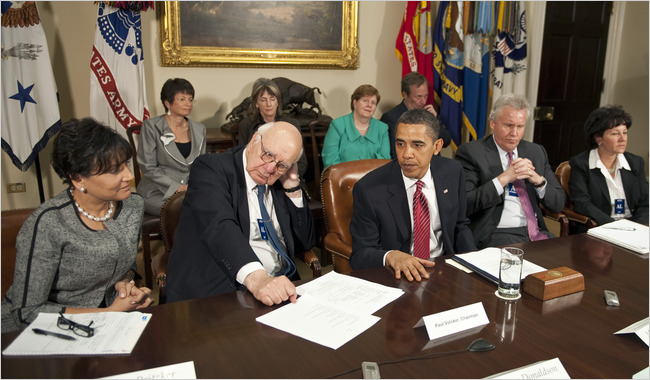
Is Paul Volcker starting to crack?
Larry Summers, Tim Geithner and President Obama all agree; there will be no call to split-up the largest banks under their watch. Makes you wonder why Volcker even bothers. As the lone voice of sanity in a sea of Wall Street capture, Volcker's story is told.
From the New York Times
- Mr. Volcker’s proposal would roll back the nation’s commercial banks to an earlier era, when they were restricted to commercial banking and prohibited from engaging in risky Wall Street activities.
- The Obama team, in contrast, would let the giants survive, but would regulate them extensively, so they could not get themselves and the nation into trouble again. While the administration’s proposal languishes, giants like Goldman Sachs have re-engaged in old trading practices, once again earning big profits and planning big bonuses.
- Mr. Volcker argues that regulation by itself will not work. Sooner or later, the giants, in pursuit of profits, will get into trouble. The administration should accept this and shield commercial banking from Wall Street’s wild ways.
- “The banks are there to serve the public,” Mr. Volcker said, “and that is what they should concentrate on. These other activities create conflicts of interest. They create risks, and if you try to control the risks with supervision, that just creates friction and difficulties” and ultimately fails.
- The only viable solution, in the Volcker view, is to break up the giants. JPMorgan Chase would have to give up the trading operations acquired from Bear Stearns. Bank of America and Merrill Lynch would go back to being separate companies. Goldman Sachs could no longer be a bank holding company. It’s a tall order, and to achieve it Congress would have to enact a modern-day version of the 1933 Glass-Steagall Act, which mandated separation.
- Glass-Steagall was watered down over the years and finally revoked in 1999. In the Volcker resurrection, commercial banks would take deposits, manage the nation’s payments system, make standard loans and even trade securities for their customers — just not for themselves. The government, in return, would rescue banks that fail.
- On the other side of the wall, investment houses would be free to buy and sell securities for their own accounts, borrowing to leverage these trades and thus multiplying the profits, and the risks.
- Being separated from banks, the investment houses would no longer have access to federally insured deposits to finance this trading. If one failed, the government would supervise an orderly liquidation. None would be too big to fail — a designation that could arise for a handful of institutions under the administration’s proposal.
- “People say I’m old-fashioned and banks can no longer be separated from nonbank activity,” Mr. Volcker said, acknowledging criticism that he is nostalgic for an earlier era. “That argument,” he added ruefully, “brought us to where we are today.”
**********
Steve here. The answer is simple. Wall Street and the financial services industry own Washington -- both parties. George Carlin explained it as well as anyone. Sure, there are occasional voices of reason to be heard above the lobbying din, but since both Congressional leadership and the executive branch (President Banks Obama) have been captured by Goldman and others, the demands for sanity and reason are simply brushed aside, while the wishes of scumbag financial lobbyists make their way straight into legislation. It's a Wall Street party on Capitol Hill and the bill goes directly to you.
***********************
PLEASE email, facebook, re-tweet, share and take our stories with you when you leave. Our only weapon against the madness is GREATER AWARENESS. Thank you.